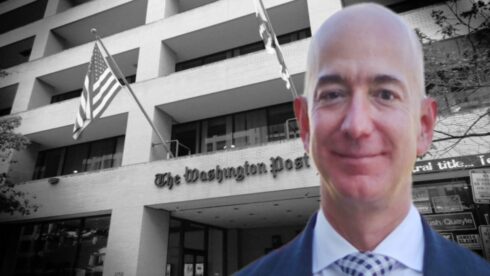The Washington Post is experiencing a massive subscriber exodus, with over 75,000 paid digital cancellations following Jeff Bezos’s controversial overhaul of the paper’s opinion section. Bezos’s decision to personally oversee editorial direction and shift the focus toward a more libertarian-leaning framework has sparked outrage among readers and journalists alike.
This backlash follows earlier subscription losses in late 2024, when the Post abandoned its long-standing tradition of endorsing presidential candidates. The combined effect of these editorial shake-ups has led to one of the most significant crises in the paper’s history, with many questioning whether the Post can maintain its credibility and influence in the ever-evolving media landscape.
Washington Post Journalists Rebel as Top Editors Resign in Protest
The Washington Post’s internal turmoil is escalating as high-profile resignations shake the newsroom. Opinion editor David Shipley has stepped down, reportedly due to frustrations over Jeff Bezos’s hands-on approach to editorial decisions. Pulitzer Prize-winning cartoonist Ann Telnaes has also exited, joining a growing list of staffers who object to what they see as excessive corporate interference in journalism.
Sources within the Post describe an atmosphere of unease, with veteran journalists fearing that Bezos’s increasing influence will stifle independent thought and editorial diversity. Some insiders warn that if the billionaire owner continues to dictate the paper’s direction, more resignations—and further reputational damage—are likely to follow.
Washington Post’s Financial Future at Risk Amid Mass Cancellations
The Washington Post relies heavily on subscription revenue to sustain its operations, making the sudden loss of tens of thousands of paid subscribers a significant financial blow. While digital subscriptions have been the paper’s primary growth driver in recent years, this latest controversy threatens to reverse that progress.
Industry analysts speculate that if the Post fails to regain reader trust, it may be forced to implement major cost-cutting measures, including layoffs and reductions in investigative coverage. The paper’s leadership now faces the daunting challenge of balancing financial sustainability with the growing perception that editorial integrity is being compromised under Jeff Bezos’s ownership.
Washington Post’s Shift Sparks Fierce Political and Public Backlash
Jeff Bezos’s editorial shake-up has ignited widespread debate, with critics accusing the Washington Post of abandoning its legacy of journalistic independence. The restructuring of the opinion section has drawn sharp criticism from progressive readers, who see it as an attempt to inject a pro-corporate, libertarian ideology into one of America’s most influential newspapers.
Meanwhile, conservative commentators have applauded the changes, viewing them as a necessary correction to what they perceive as the Post’s historically left-leaning bias. This ideological divide has only deepened the controversy, putting the paper at the center of a broader national debate over media ownership, political influence, and the future of American journalism.
Washington Post’s Crisis Fuels Surge in Independent Media Popularity
As trust in mainstream media erodes, the Washington Post’s struggles are amplifying the rise of independent media outlets. With many readers frustrated by what they see as corporate and political interference in legacy publications, independent journalists, Substack writers, and alternative news platforms are gaining traction.
This shift reflects a growing demand for diverse perspectives and unfiltered reporting. If traditional outlets like the Post fail to adapt to this changing media landscape, they risk losing not only their subscribers but also their relevance in an industry that is rapidly evolving toward decentralization and reader-driven funding models.
Washington Post’s Identity Crisis: Can It Survive Under Bezos’s Rule?
The Washington Post is at a crossroads, and its future hangs in the balance. Can it maintain its reputation as a pillar of investigative journalism, or will Bezos’s growing control push it into a new, uncertain era of corporate-driven media? The coming months will determine whether the Post can recover from its subscriber exodus and internal turmoil—or if it will continue to bleed credibility and influence.
For now, the backlash shows no signs of slowing down, and the Post’s leadership must make critical decisions to restore trust among both its readership and its own journalists. Whether Jeff Bezos chooses to double down on his vision or step back from direct editorial involvement remains one of the biggest questions facing the future of American journalism.














